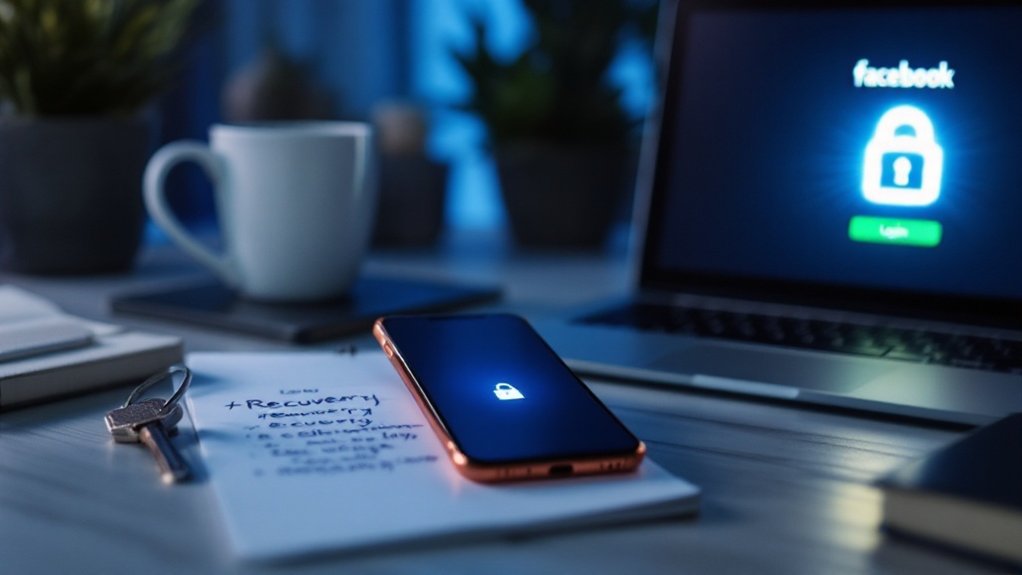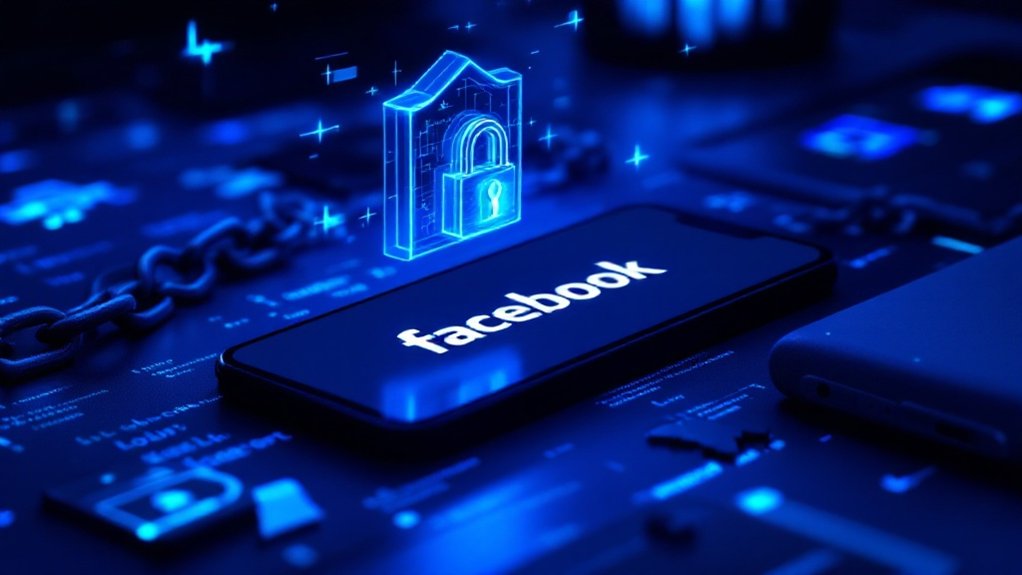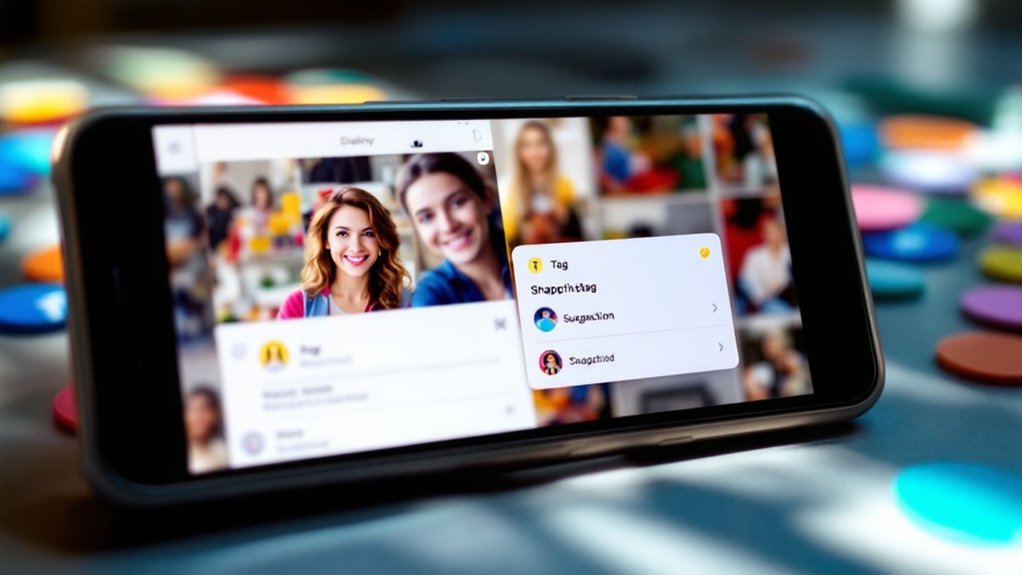If your Facebook account's hacked, act fast. Use the "Forgot password?" feature immediately and report the compromise through Facebook's official tools. Have your last known password ready for verification. Don't fall for scam recovery services—Facebook doesn't charge for this. Be prepared to upload ID if requested. After recovery, enable two-factor authentication and change all passwords. Tell friends about the hack so they don't get tricked too. The next steps could save your online identity.

When panic sets in after discovering unauthorized access to a Facebook account, users often make mistakes that complicate recovery. They click suspicious links. They pay shady "recovery experts." They abandon hope. All wrong moves.
First step? Figure out what you're dealing with. Hacked account or just disabled? Big difference. Use the "Forgot password?" feature immediately—it's there for a reason. Facebook's compromised account reporting tool exists too. Use it. Similar to Google account recovery, having your last known password ready can help verify your identity.
Recovery requires information. Gather every email and phone number ever connected to the account. Facebook needs these. Scammers know you're desperate. They'll offer "guaranteed" recovery services for a fee. Don't fall for it. Seriously.
Identity verification matters. Facebook may request photo ID. Send it through their official channels only. Remember to visit the official Facebook ID uploader to submit verification documents securely. Once back in, enable two-factor authentication right away. Not tomorrow. Now. Update all recovery information while you're at it.
The infamous "recovery deathloop" traps many users. Failed attempts lead to more failed attempts. Break the cycle by trying alternative sign-in methods. Account names sometimes work when emails don't. Consider using a one-time password via SMS if available for your country and mobile carrier.
Support options exist, though limited. Facebook's direct customer service isn't winning any awards. Online forums like Reddit offer community wisdom. Some users report success after contacting authorities in severe cases. Similar to detecting spyware, running in safe mode can help isolate security issues. The FBI has cyber divisions. Use them if necessary.
After recovery, change everything. New password. New security questions. New habits. Use a password manager—remembering unique passwords for fifty websites isn't a human strength.
Tell friends and family about the hack. Your contacts might receive strange messages from your account. Warn them.
Prevention beats recovery every time. Regular software updates close security holes. Suspicious links deserve suspicion. That random message from a high school acquaintance offering million-dollar opportunities? Probably not legitimate.
Recovery takes patience. Facebook processes thousands of similar cases daily. Your account isn't special to them. But persistence pays off. Keep trying different approaches. Document everything. Eventually, that blue-bannered digital identity will return to its rightful owner.
Frequently Asked Questions
How Long Does the Facebook Account Recovery Process Typically Take?
Facebook account recovery typically takes 1-2 weeks.
Simple cases? Maybe a few days.
Complex situations where hackers added emails or enabled 2FA? Longer, obviously.
The whole process hinges on Facebook's review speed—which isn't exactly known for being lightning-fast.
Most users get back in within a couple weeks.
Verification methods like government ID submission can speed things up.
Bottom line: patience required.
Facebook moves at its own pace.
Can I Recover My Account Without Access to My Backup Email?
Recovering accounts without a backup email? Tough spot.
Facebook offers alternative methods, but they're limited. Users can try the recovery form with detailed account information—creation date, friend names, previous passwords. Sometimes works.
Customer support might help, no guarantees though. Identity verification gets tricky without that backup.
Some folks try submitting ID documents or answering security questions. Success rates vary wildly.
Two-factor authentication would've prevented this mess in the first place. Just saying.
Will I Lose My Posts and Photos After Recovering My Account?
Most users won't lose posts and photos after recovering a hacked Facebook account.
Facebook's system typically preserves user data unless the hacker specifically deleted content. That's the good news.
The bad news? If the hacker went on a deletion spree, some content might be gone for good.
Facebook does provide tools to manage and restore certain deleted content through settings.
Regular backups are smart. Data loss happens, but it's rare. Thank technology for small favors.
What if the Hacker Changed My Phone Number and Email Address?
When hackers change both phone number and email, recovery gets trickier. No joke.
Users need to report the compromised account through Facebook's dedicated reporting system. They'll need to verify their identity – possibly with official documents. Facebook support might request ID verification to confirm ownership. The process takes time. Patience required.
Once recovered, enabling two-factor authentication is essential to prevent future attacks. Nothing's guaranteed, but Facebook has systems in place for these situations.
Can I Prevent My Facebook Account From Being Hacked Again?
Preventing Facebook hacks is totally doable. Users need strong, unique passwords—no, your pet's name isn't cutting it.
Multi-factor authentication is non-negotiable these days. Regular account reviews catch suspicious activity fast.
Phishing attempts? Don't click that sketchy link, period. Public Wi-Fi is a hacker's playground, so avoid it.
Reviewing app permissions helps too. Most people forget this part until it's too late.
Facebook security tools exist for a reason—use them.




